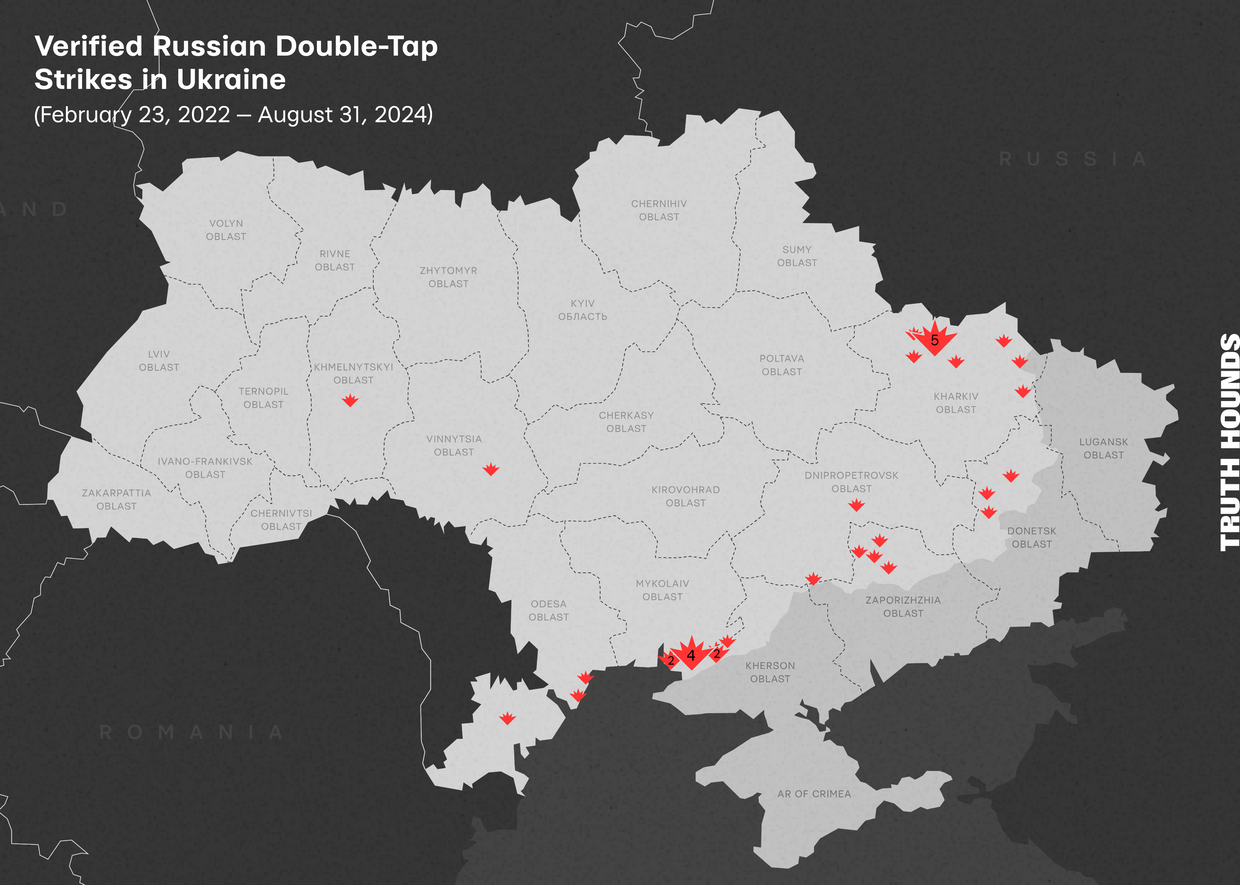Russia carried out at least 36 double-tap strikes in Ukraine, killing over 100 people since 2022, report says

The Russian military carried out at least 36 double-tap strikes against Ukraine from the start of the full-scale invasion in February 2022 to August 2024, killing over 100 people, according to a recent report by Truth Hounds, a Ukrainian non-profit organization that documents and investigates war crimes. Twenty such attacks were carried out this year alone.
A double-tap attack is an illegal military tactic in which an initial strike is followed by a delayed second strike, usually intended to kill or injure first responders who arrive at the scene and cause panic among the population. Russia has been using this tactic extensively in Ukraine and previously in Syria alongside Bashar al-Assad's government forces.
According to Truth Hounds, their report confirms that Moscow deliberately uses double-tap attacks to hinder humanitarian aid efforts, with Russian propaganda framing the killing of Ukrainian first responders as justified.
Truth Hounds verified 36 cases of Russian double-tap strikes, although the overall number of incidents displaying the characteristics of double-tap attacks exceeds 60.

According to the report titled "Cruelty Cascade: Examining the Pattern of Russian Double-Tap Strikes in Ukraine," Russian forces have dramatically increased the use of this tactic in 2024, with instances this year alone surpassing the verified cases from the previous two years combined.
Over 100 people were killed in the 36 double-tap attacks, verified by Truth Hounds, but it is unclear how many of them died as a result of the secondary strikes, Roman Koval, the organization’s head of research, told the Kyiv Independent.
In July 2024, Andrii Danyk, the head of Ukraine’s State Emergency Service, reported that 93 emergency workers had been killed and almost 400 injured since the start of the full-scale invasion, though not all of these casualties had resulted from Russia's double-tap attacks.
Russian double-tap strikes wounded nearly 350 civilians from April 2022 to April 2024, said Timothy Hanway, the acting U.S. envoy to the Organization for Security and Co-operation in Europe (OSCE), in an address on April 25. Hanway also highlighted that Russia's usage of this illegal tactic had been increasing.
Since 2014, Truth Hounds has been documenting and investigating international crimes and severe human rights violations across Ukraine and other conflict zones in Eastern Europe, the Caucasus, and Central Asia. Their latest report delves into the pattern and impact of Russian double-tap strikes in Ukraine, offering a legal assessment of these actions and their implications.

In collaboration with the White Helmets — a humanitarian organization focused on helping communities prepare for, respond to, and rebuild after attacks in Syria — Truth Hounds established “a strong connection” between Russia's use of double-tap attacks in Syria and Ukraine, according to the organization’s press release. In July 2023, the White Helmets reported having lost over 300 volunteers in the Syrian war, with the majority killed in double-tap attacks.
In an earlier comment for the Kyiv Independent, Janine di Giovanni, a human rights reporter and investigator with over 30 years of experience working in war zones, called Russian double-tap attacks "a part of a larger strategy of punishment and control," noting that Russian President Vladimir Putin "has a pattern of attacking civilians indiscriminately."
Truth Hounds suggested in the report that the rise of Russian double-tap attacks in 2024 could be linked to the appointment of a new commander of the Russian Missile Troops and Artillery, along with a new head of the Main Missile and Artillery Directorate of the Russian Defense Ministry. "This fact warrants further investigation to uncover the underlying interdependencies, including potential shifts in operational strategy or tactical priorities under their leadership."
The report also assesses the conditions under which double-tap strikes could be considered war crimes. These attacks violate the provisions of the Rome Statute, which explicitly forbids intentional targeting of civilians, and violate the article protecting medical and humanitarian personnel from attacks.
"Our research has thoroughly demonstrated that even if the first strike targets a legitimate military target, the second strike — typically delayed and aimed at rescuers and wounded personnel — crosses the line of legality, transforming these actions into war crimes," said Yuriy Uhryn, a lawyer at Truth Hounds, in a press release shared by the organization.
Based on the report, Truth Hounds outlined a set of recommendations for the Ukrainian and foreign governments, international organizations, and the International Criminal Court. These include investigating Russian double-tap strikes in both Ukraine and Syria, increasing support for Ukrainian and Syrian first responders, promoting public condemnation of these war crimes, and advocating for stronger sanctions against Russia.
“The current situation highlights a critical pattern: impunity for international crimes tends to facilitate their recurrence, placing civilians in increasingly precarious positions,” Truth Hounds said in a statement. “The absence of effective measures to address such violations undermines international norms and emboldens those who commit these acts.”
Ukrainian authorities recorded almost 140,000 war crimes committed by Russian troops in the country, President Volodymyr Zelensky said at the United for Justice conference in Kyiv on Sept. 11. Slightly over 100 people were found guilty of war crimes as of late March, most of them in absentia, according to Zmina, a Ukrainian human rights organization.
Truth Hounds believes it’s crucial to continue investigating Russian double-tap attacks and prosecuting the perpetrators.
“People who lost their loved ones to such attacks or were directly affected by them demand justice, and even if this demand can be satisfied only partially through sentences in absentia, it is still worth doing,” said Koval.
“Russian suspects in war crimes still travel abroad, and such cases are not isolated. Considering that war crimes do not have a statute of limitations, this also significantly increases the chances of their arrest when they leave Russia sooner or later.”











